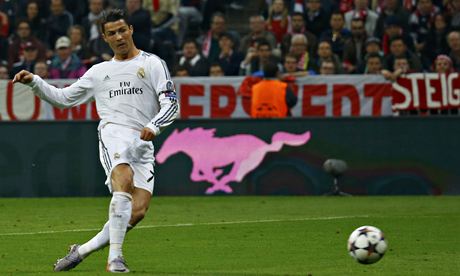
Cristiano Ronaldo finishes off a lightning-quick break to score Real Madrid's third goal at Bayern Munich. Photograph: Kai Pfaffenbach/Reuters
The victory was extraordinarily more comprehensive, but this tactical battle was incredibly similar to the first leg, where Bayern Munich dominated possession without offering any penetration, and Real Madrid attacked at speed. In Madrid, the Spanish side's best two chances had come from ruthless counterattacking play – Karim Benzema putting Real ahead on the break, and Cristiano Ronaldo missing a golden chance to double the lead in similar circumstances. Here, the pattern was simply more extreme.
That was logical considering the slight differences in situation and lineups – whereas Bayern had played cautiously in the first leg, here they required a victory and necessarily played more adventurously. Thomas Müller was fielded as a supplementary striker, whereas Guardiola had previously used three midfielders, while the return of Gareth Bale ensured Real Madrid had yet another devastating weapon on the break.
But if the pattern was predictab le, the sheer one-sidedness was remarkable. Real were rampant, and there were warning signs from the opening minutes, with Angel di María overlapping Ronaldo on the break in an almost identical situation to the movement shown by Fábio Coentrão for Real's goal in the first leg. Bayern started by playing more directly than we've come to expect, but then retreated into their shell and offered slow, patient and rather predictable passing football. Real simply sat deep in two banks of four, waited for Bayern moves to break down, then attacked at tremendous speed.
The use of that midfield quartet meant Ronaldo was able to play upfront alongside Benzema, and at transitions Bayern were simply unable to cope two-against-two at the back, with Jérôme Boateng and Dante lacking midfield protection. As Bayern were using a high defensive line, Manuel Neuer was forced to sweep up outside his box, twice getting his clearances wrong, allowing first Bale and then Ronaldo to attempt long-range efforts at an empty net – both were off target. When even Neuer, the ultra-dependable goalkeeper widely considered the best in the world, was unable to perform simple tasks which are usually second nature, it was clear Bayern were in for a difficult evening against Real's pace.
As vulnerable as Bayern were to counterattacking, however, their terrible set-piece defending was their most crucial failure. Twice Sergio Ramos headed into the net when unmarked, which represents a worrying regression from last season, when Bayern got their noses in front against Spanish opposition, Barcelona, at this stage because of their own set-piece power.
Indeed, it was something of a role reversal. Bayern were now playing the fruitless tiki-taka while their opponents powered their way in front from set plays, then turned a commanding lead into a rout with brilliant counterattacking. Real's third goal summed it up, with Benzema, Bale and Ronaldo motoring forward instantly when possession was won, constructing a lightning-fast break based around speed and selflessness.
Bayern had little response. There was surprisingly little invention from the midfield zone, with Arjen Robben and Franck Ribéry the only players willing to take risks in possession. Guardiola's half-time change must be the first time in history a manager has introduced a holding midfielder, Javi Martínez, in place of a striker, Mario Mandzukic, when requiring five goals. The Spaniard at least provided the Bayern centre-backs with some much-needed protection, while Müller moved forward to offer more varied movement than Mandzukic upfront.
But Bayern were never going to score five goals, and did not manage any – a testament to Real's brilliant defensive structure.
Carlo Ancelotti's side defended excellently as a unit, with their physically imposing but occasionally rash centre-backs protected by a high ly disciplined midfield quartet. Arguably Ancelotti's most impressive achievement is fielding a midfield featuring four naturally creative players – Bale, Luka Modric, Xabi Alonso and Di María – without suffering from any defensive issues. Alonso's suspension from the final is a significant blow to Real, although it's at least an excuse for Ancelotti to bring some physicality into the midfield, assuming the long-term injury absentee Sami Khedira is fit to return.
Regardless of whether Atlético Madrid or Chelsea progress to face Real in the final, it will be a contest between two counterattacking specialists, rather than possession hoarders. This certainly isn't the death of tiki-taka – but it's becoming impossible to deny that reactive football is currently dominant.
No comments:
Post a Comment